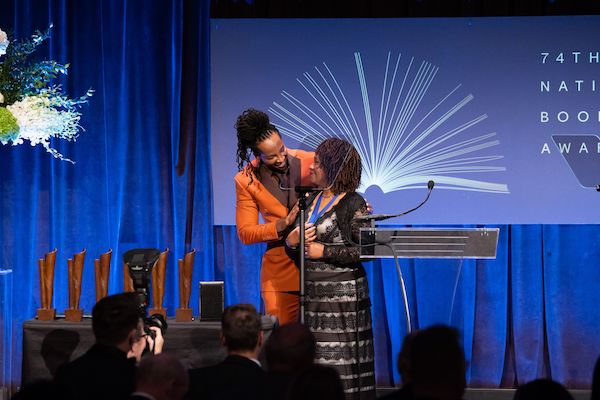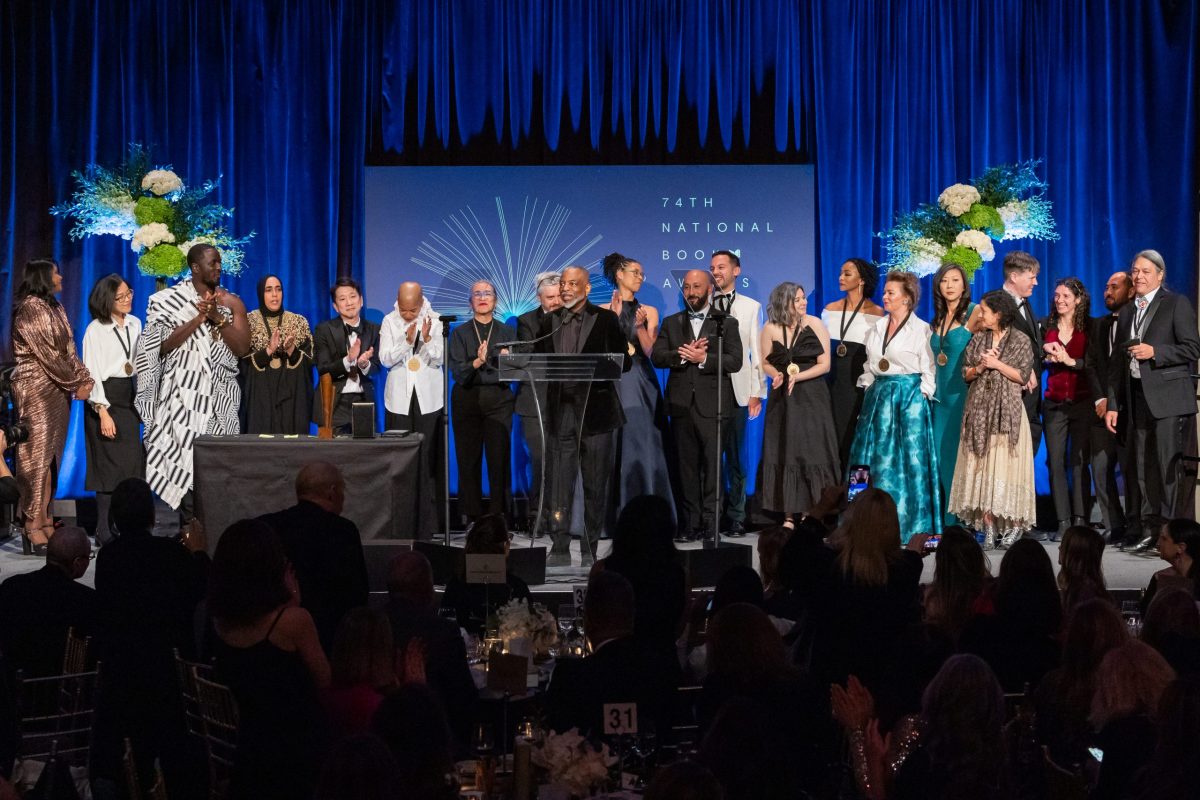The National Book Awards took place on November 15th at Cipriani Wall Street in New York City. A day before the biggest night in books, two sponsors—Book of the Month and Zibby Books—announced they were not attending because of “political speeches,” following rumors that the nominees were planning to call for a ceasefire in Gaza. Zibby Owens, founder of Zibby Media and daughter of Blackstone billionaire Stephen A. Schwarzman, rescinded her donation, citing “a pro-Palestinian, anti-Israeli agenda” in her newsletter (which was full of oxymoronic gems like “I don’t support censorship” while using her money to do just that). As of today, more than 11,200 Gazan have died as a result of bombardment by Israeli forces, while millions more have been displaced without access to electricity, medical aid, and food.
A day before, two sponsors announced they were not attending because of ‘political speeches.’
Last year, the topics dominating the National Books Awards were censorship, free speech, and book bans (all political issues). But book bans have not gone away, instead the number of challenged books have surged in recent months. This year, Palestine and Israel were the elephants in the room—only alluded to obliquely by most until the final moments of the evening—while the focus remained on censorship and free speech.
LeVar Burton—who stepped in as the host of the ceremony after Drew Barrymore was disinvited for crossing the WGA picket line—started the evening by asking if there were any Moms for Liberty in the house, a right-wing group at the forefront of trying to ban books containing themes of sexuality and race from libraries and schools. The Reading Rainbow host warned the audience that books are being attacked because they’re so powerful, saying: “The idea of freedom feels especially fraught in this global political moment… We are fighting for control of truth and how we interpret truth in this country. Books are being banned, words are being silenced, writers are under attack.”

The special guest of the night was Oprah Winfrey, who was being honored for tremendous advocacy of authors and reading. In an emotional and rousing speech, she told the audience about the first time she read a book with a Black protagonist at age 15—Maya Angelou’s I Know Why the Caged Bird Sings: “That book gave a voice to my silences, my secrets. It gave words to my pain and my confusion of being raped at 9 years old. Until then, I didn’t know that there was a language, that were words for what had happened to me, or that any other human being on earth had experienced it. That’s the power of books… To ban books is to cut us off from one another, in a soulless echo chamber. Let us let everyone choose for themselves what they want to read. That is called freedom.”
On a night when the special guest was the OG of the celebrity book clubs, it’s only fitting that Emma Roberts (Belletrist) and Kaia Gerber (Kaia Gerber’s Book Club) were also in attendance.

Next, two lifetime achievements awards were presented: the Medal for Distinguished Contribution to American Letters to poet Rita Dove, and the Literarian Award for Outstanding Service to the American Literary Community to bookseller Paul Yamazaki.
For Jericho Brown, reading Rita Dove gave him the sense of possibility of becoming a poet: “Possibility is what gives us the nerve to write, to make something out of our scribbles. All us here have been told that writing is not a sustainable living, yet we are here proving the naysayers wrong.”
In her speech, Dove, a Pulitzer-Prize winner, said: “What a poet manages to ink onto a page (or put into a computer’s memory, as it were) is just a silhouette, a shadow of that essential enigma that we call life.”
In an introduction by fellow bookseller Mitchell Kaplan, Yamazaki was heralded as “a catalyst of change.” Kaplan reminisced that, “His championing of new and diverse voices and small independent presses, set an example for booksellers everywhere. He showed that these books would find readers when they were made available.” Yamazaki came to City Lights Booksellers & Publishers in San Francisco over 50 years ago after being released from a 6-month prison sentence for activism and protesting. We’ve said it before and we’ll say it again: booksellers are the unsung heroes of the literary world.
Book bans have not gone away, instead the number of challenged books have surged in recent months.
Then it was time for the awards portion of the evening. The National Book Awards ceremony includes five categories: fiction, nonfiction, young people’s literature, and translated literature. Winners, picked by a jury of writers, translators, and poets, are awarded $100,000. Finalists included a children’s book about the Ukrainian famine, a memoir about the relationship between a Palestinian father and son, a short story collection centering Black Muslims lives in America, a novel about the clash between Sami rainherders and Nordic settlers, a Native American history of the United States, tactile poetry by a DeafBlind poet, and a Dutch Suriname queer classic.
The first announcement of the night was for young people’s literature. The winner: A First Time for Everything by Dan Santat, a tender graphic novel about a 13-year-old on a school trip in Europe.

The winners for translated literature were Brazilians Stênio Gardel and Bruna Dantas Lobat for the novel The Words That Remain. Through tears, Gardel, the author, expressed how growing up as a gay boy in the hinterlands of Brazil, it was impossible for him to dream of such an honor. “Being here as a gay man, receiving an award for a novel about a gay man on a journey to self acceptance, I wanted to say to everyone whoever felt wrong about themselves that your heart and your desire are true, you are just as deserving as anyone else of having a fulfilling life and accomplishing impossible dreams.” Lobat, the translator, thanked the publisher, New Vessel Press, “for putting my name on the cover of the book, where it belongs. #NameTheTranslator. We are not mysterious fairies working in the dark. It is so rare to see the Brazil I know in translation. Here’s to reading the world with curiosity and empathy.”
Indigenous Chamoru poet Craig Santos Perez was the poetry winner for “from unincorporated territory [åmot].” His home Guam, a U.S. territory, “is one of the last remaining colonies in the world. We were never taught my own people’s literature. My mission is to inspire the next generation of Pacific Islander authors.”
Ned Blackhawk, a Native historian, won the nonfiction category for The Rediscovery of America: Native Peoples and the Unmaking of U.S. History: “The subject of American Indian history, while often simultaneously unfamiliar and discomforting, is also a shared experience that touches us all,” he said. “Native America is also a form of our national inheritance. We cannot nor should not continue its systematic erasure.”
The last and most anticipated category of the night was the fiction prize. Justin Torres won for his novel Blackouts, and in a gracious move, he kept his speech short to cede the stage to his fellow finalists for a joint statement. Their speech was presented by Aaliyah Bilal, author of Temple Folk, and cosigned by 20 out of 25 of the nominees:
“On behalf of the finalists, we oppose the ongoing bombardment of Gaza and call for an humanitarian ceasefire to address the urgent humanitarian needs of Palestinian civilians, particularly children. We oppose antisemitism and anti-Palestinian sentiment and Islamophobia equally, accepting the human dignity of all parties, knowing that further bloodshed does nothing to secure lasting peace in the region.”
It was a moving and courageous show of solidarity that reminded us that literature is and always has been political. Books don’t exist in a vacuum; they are a reaction to the world—the way it is now and the way we would like to one day be. Books have the power to ignite change, inspire activism, and shine a light on injustice. These twenty writers showed conviction and selflessness when they took the stage to stand up for what’s right—for peace, not war, for humanitarian aid, not bombs, for saving lives, not causing death—despite the opposition, the financial repercussions, and pushback from the rich and the powerful. Those of us in the room who gave them a standing ovation did so because we don’t celebrate books only for being well-written, we celebrate authors for their capacity to change the world through their writing.
Here is the 2023 National Book Award shortlist, with the winners in bold:
Fiction
- Chain-Gang All-Stars by Nana Kwame Adjei-Brenyah
- Temple Folk by Aaliyah Bilal
- This Other Eden by Paul Harding
- The End of Drum-Time by Hanna Pylväinen
- Blackouts by Justin Torres
Nonfiction
- The Rediscovery of America: Native Peoples and the Unmaking of U.S. History by Ned Blackhawk
- Liliana’s Invincible Summer: A Sister’s Search for Justice by Cristina Rivera Garza
- Ordinary Notes by Christina Sharpe
- We Could Have Been Friends, My Father and I: A Palestinian Memoir by Raja Shehadeh
- Fire Weather: A True Story from a Hotter World by John Vaillant
Poetry
- How to Communicate by John Lee Clark
- from unincorporated territory [åmot] by Craig Santos Perez
- suddenly we by Evie Shockley
- Tripas by Brandon Som
- From From by Monica Youn
Translated literature
- Cursed Bunny by Bora Chung, translated from the Korean by Anton Hur
- Beyond the Door of No Return by David Diop, translated from the French by Sam Taylor
- The Words That Remain by Stênio Gardel, translated from Portuguese by Bruna Dantas Lobato
- Abyss by Pilar Quintana, translated from the Spanish by Lisa Dillman
- On a Woman’s Madness by Astrid Roemer, translated from the Dutch by Lucy Scott
Young people’s literature
- Gather by Kenneth M. Cadow
- Huda F Cares? by Huda Fahmy
- Big by Vashti Harrison
- The Lost Year: A Survival Story of the Ukrainian Famine by Katherine Marsh
- A First Time for Everything by Dan Santat
Photographs of the National Book Awards by Beowulf Sheehan, courtesy of the National Book Foundation.
